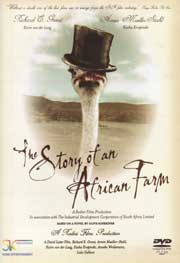This article relies largely or entirely on a single source .(July 2020) |
| The Story of an African Farm | |
|---|---|
 | |
| Directed by | David Lister |
| Written by | Thandi Brewer Bonnie Rodini Olive Schreiner (novel) |
| Produced by | Ross Garland Bonnie Rodini Cindy Rodkin |
| Starring | Richard E. Grant Armin Mueller-Stahl |
| Cinematography | Peter Tischhauser |
| Edited by | Josh Galvin |
| Music by | J.B. Arthur |
| Distributed by | Freestyle Releasing (US) |
Release date |
|
Running time | 97 minutes |
| Countries | United States South Africa |
| Language | English |
The Story of an African Farm, released in the United States as Bustin' Bonaparte: The Story of an African Farm, [1] is a 2004 South African film directed by David Lister and based on the 1883 novel of the same name by South African author Olive Schreiner.